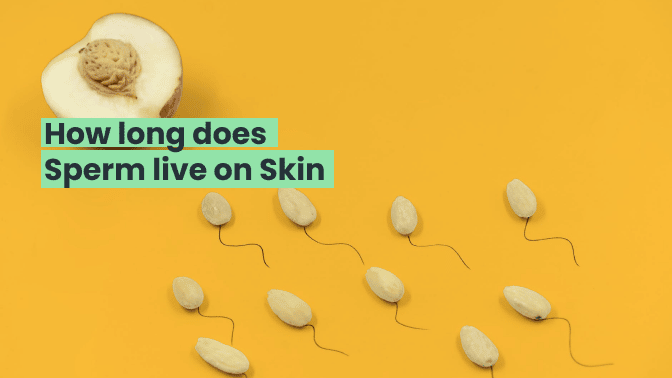Semen is a fluid mixture that includes sperm, vitamins, and minerals. The male reproductive cell, sperm, may result in pregnancy when it fuses with a female’s egg.
Within minutes following ejaculation, semen travels to the uterus. For up to seven days, sperm may survive within the vagina. There is no known scientific method of eliminating sperm after it has entered the uterus.
Some vaginal fluid may leak between a few minutes and many hours following sexual contact. The majority of this will be a combination of proteins and vitamins from ejaculation, while some of it may include sperm.
After having sex, some individuals may desire to remove the semen from their vagina because they think it is more sanitary or in the hopes that it would prevent pregnancy.
There is no scientific evidence to back up assertions that it is possible to remove semen from the vagina, despite anecdotal evidence to the contrary.
How to quickly remove sperm from your body
The following are some methods for naturally flushing sperm from the body:
Urination: Some individuals mistakenly think that peeing just after intercourse can drain sperm out of the vagina. Peeing after intercourse won’t flush sperm from the vagina, however, since urine emerges via a tiny opening known as the urethra.
Showering or douching: People may attempt to remove semen from their vagina by showering or douching, but this is unlikely to be successful since the water will not be able to reach the uterine semen and won’t be able to quickly remove sperm from your body.
Bathing: It makes sense to take a bath to wash away semen since it will also eliminate sperm. This won’t work, however, since the water won’t get to the uterus.
Vinegar: Due to vinegar’s high degree of acidity, some individuals think that injecting vinegar into the vagina may destroy sperm. The vaginal ingestion of vinegar may cause irritation, and there is no scientific evidence to support this claim.
How to Successfully Avoid Pregnancy
Andrews should be ignored Pregnancy can’t be prevented by using liver salt, lime, ampiclox, alabukun, salt and hot water, 7-Up, alum, aloe vera, or neem. There are various techniques to avoid becoming pregnant for individuals who don’t want to.
Although most people use hormonal and nonhormonal birth control, some people may also think about using natural or surgical birth control. Pregnancy may be prevented effectively by;
The condom: The condom is the only method of birth control that prevents pregnancy and protects against the majority of STIs. This hormone-free, on-demand contraception is portable and may be simply taken about. Both male and female variants are available.
The Oral Contraceptive Pill: The oral contraceptive pill is a little tablet that must be taken once daily. The oral contraceptive pill is the form of contraception that Australian women report using the most often.
Intrauterine Device (IUD): A qualified healthcare professional inserts this tiny, T-shaped device into a woman’s uterus. It is constructed of a material that contains progesterone hormone or plastic and copper.
It is a reversible, long-acting form of contraception that, depending on the kind, may be used for three to ten years. Some IUDs include hormones to inhibit conception that are delivered gradually.
If the IUD is inserted by a medical practitioner within five days (120 hours) after having unprotected intercourse, it may also be a helpful emergency contraceptive. You are nearly as protected as you can be by a contraceptive technique since copper-containing IUDs are 99% effective and hormone-containing IUDs are 99.8% effective.
Read Also: How to Confirm Whether Sperm Went Inside
The contraceptive implant releases a version of the hormone progesterone when a short, flexible rod is inserted beneath the skin in a woman’s upper arm.
The hormone thickens the cervical mucus, which makes it more difficult for sperm to enter the womb, and prevents the ovary from releasing the egg. The rod must be fitted and removed from the implant using a brief process under local anaesthesia, and the implant has to be changed every three years.
An artificial form of the hormone progestogen is included in the contraceptive injection. The hormone is injected into a woman’s buttock or upper arm, and over the course of the next 12 weeks, it slowly releases into circulation.
How to successfully urinate after sex
The vagina is self-cleaning, thus there is no need to clean it right away after intercourse, claims Medical News Daily. However, many women may find the semen’s slimy texture repulsive. If you fall into this category, you can clean your vagina in a number of different methods. The simplest method is to gently cleanse the vaginal region with warm water.
The vaginal region should be cleaned with gentle, unscented soap, according to the American Sexual Health Association (ASHA). It is advised to stay away from fragrant soaps since they might irritate vaginal tissue by altering the pH balance.
Some individuals may think of douching the vagina, which is spraying it with a stream of water from a shower douche or bottle. However, as was previously said above, physicians do not ever advise douching. According to research, it lowers the quantity of beneficial bacteria in the vagina, which might result in a range of health problems.
Conclusion
If your goal in eliminating sperm is to maintain the vagina clean, you may attempt the procedure, but it is generally advised to utilise the scientifically proved ways since they are more trustworthy than anecdotal advice.
Despite the fact that the scientifically validated ways work, it is still a good idea to talk to your doctor so they may recommend the approach that will work the best for you.
